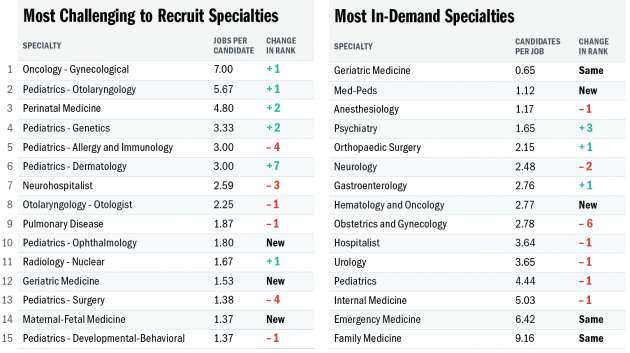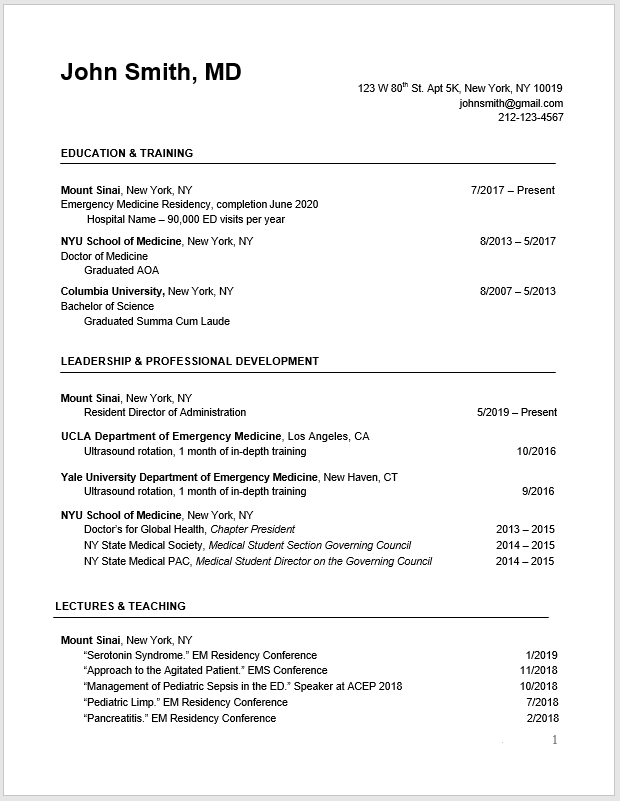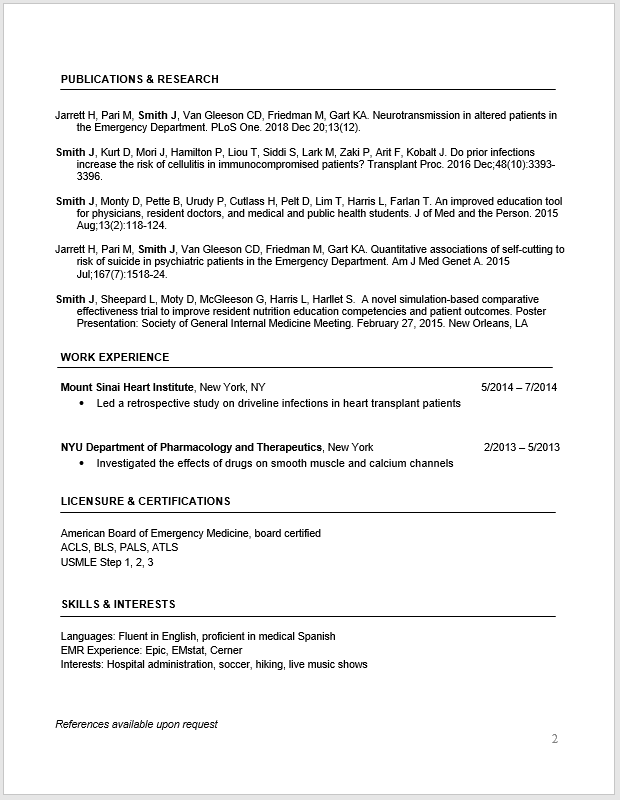
Most contract negotiations begin with salary – but there are plenty of good reasons to think that’s a mistake and can even end up costing the doctor later.
According to Chris Nuland, a health care attorney in Jacksonville who represents hundreds of physicians and physician groups, the first thing doctors should do with a potential job offer is ignore the salary.
“Salary is important,” Nuland says, “but it’s not the most important part. The most important part is whether you’re going to be doing what you want with people you want to do it with, and does your contract get you where you want to be long-term.”
Unfortunately, many new doctors are uniquely vulnerable to making trade-offs for a higher salary.
As Rivers points out, a lot of residents are coming out of their programs after earning $40,000 a year and working 60+ hour weeks. They are often carrying tens if not hundreds of thousands of dollars in medical school debt. And they simply have a hard time believing that someone will pay them four or five times their previous salary for doing basically the same job.
“When you’re coming out of your residency, you feel like anything they offer is so much more than you made in residency,” Rivers says. “So you take anything.”
The result is that young doctors frequently underestimate their own value or let employers set the terms of the negotiation because they’re intimidated by the relatively higher salary.
“The tendency is to take the first offer,” Brown says. “They are under crushing debt and there is a long pent-up desire to get a salary, replace the old beater, get a house and start saving for college for their kids.”
So here’s negotiating tip number one: Don’t be the one to bring up money, even if it was mentioned in the job posting you responded to.
“Never, ever mention salary,” Brown says. “Whoever mentions salary first is at a disadvantage. But docs under pressure will look at a series of ads and go to the ones that offer a high salary. That’s a mistake. Young docs rarely see the tree in front of their face. You’re looking to build a long-term relationship. I tell them to go to 5,000 feet.”
If you’re not supposed to look at salary first, then where do you begin? According to the experts, a contract negotiation is a time to think strategically about your long-term career and life goals so you can drill into the particulars and fight for what’s important to you.
“Quality of life is the most important thing for many young physicians, especially as we move toward an employment setting instead of an individual practice setting,” says Kyle Claussen, JD, LLM, vice president of Resolve Physician Agency.
This means paying attention to every clause of the contract and asking if it fits into your career plan and your lifestyle. If you have young children, for example, you might want reduced or at least more flexible weekend on-call hours. If you’re in major debt and need to pay it down, you might be willing to trade some on-call hours for a higher salary, or even push for a signing bonus.
Some of the elements of your contract you might be able to negotiate include:
On-call hours. In terms of importance, this one typically tops the list – even over salary for many physicians. It’s understandable that the most junior employees should expect to have the worst hours, including weekends and holidays. But if the terms are particularly onerous, including every weekend and holiday, they might be negotiable. At the very least, the on-call hours should be equitable with physicians of similar experience and tenure levels. Also, the on-call schedule should be clearly spelled out. Don’t agree to a contract with “hours to be specified by employer” in it, or you might end up working every weekend and holiday and 80-hour workweeks for the indefinite future.
A track to advancement. This can be a tricky area, but Nuland says it shouldn’t be underestimated. Especially physicians who are looking at employment in medical practices (as opposed to hospitals) should try to get insight into the “path to partnership.”
“I believe every contract for a new doctor should have a partnership track somewhere in the contract,” Nuland says. “I want it to say in the contract if they’re eligible for shareholder status and have a track to get there.”
Practices are naturally hesitant to spell this out for new hires, but Nuland says there should at least be an understanding about when a new doctor would be eligible to begin earning partnership status and how it can be attained. The alternative – vague, open-ended clauses with no enforceable statements – works against the doctors and for the practice, which can indefinitely postpone a track to partnership.
“Ten or 15 years ago, it used to be you’d make partner in two or three years,” Claussen says. “It’s not like that anymore. We like to see goals or structure in how a partnership is run.”
This clause is much different for hospitalists, who are often joining large health care networks as employees. In this case, it may be impossible to delineate a path to advancement in the original employment contract.
The non-compete clause. Depending on the state, this can be a major long-term issue that’s easy to overlook during the initial negotiation. In many states, physician contracts often include a non-compete clause that prohibits a doctor from competing against a former employer for a certain length of time and/or a certain distance.”The standard is two years, 20 miles,” Nuland says.
As Nuland points out, however, this can be a major issue for some doctors. In general, he recommends negotiating to reduce the distance and increase the timeframe, instead asking for three years and 10 miles.
The reason for this is simple: in some crowded, urban areas, a 15-mile non-compete radius might mean a two-hour drive each way. Thus, quitting the practice means moving to continue in your specialty or facing an extremely inconvenient and long commute.
“If you’re staying in the same area, distance becomes a problem,” Nuland says.
Bonuses. Bonuses come in many shapes and forms – and all of them are negotiable. Looking back on her negotiating experience, Rivers wished she had negotiated for a signing bonus. End-of-year bonuses can also be valuable.
“I want all of my physicians to have some kind of incentive, but I don’t want it based on receivables,” Nuland says. “Here’s why: In your first year, you only get to collect nine months of receivable, because of the insurance billing cycle. Second, you’re basing your effectiveness and incentive on the front office staff. In any contract, you don’t want to be held hostage to things that are not under your control.”
Malpractice tail insurance. This is something of a “back door” clause that many physicians don’t appreciate until long into their employment, when it can be disastrous. Tail insurance covers a doctor for malpractice claims that might arise after they leave a practice. It can be very expensive – sometimes as much as 200 percent of the face value of the original insurance policy. From a physician’s point of view, tail insurance should be included in the original contract. If it isn’t, you might find yourself held hostage to your employer, unable to leave a practice because of the high cost of purchasing your own tail insurance.
Membership in insurance plans. Again, this applies primarily to doctors working for practices, but it can be a problematic area. Many practices insist that their doctors accept all of the practice’s managed care plans. This isn’t always possible, however, and just like the issue of bonuses, it’s beyond your control. Instead, Nuland recommends revising the clause to say that you’ll make your “best effort” to join every managed care plan, but that you can’t guarantee it.
Scope of work. This frequently overlooked item can mean the difference between a positive and negative work experience. “As a new employee, you don’t want to perform ’duties specified by the employer,’” Nuland said. “They could have you sweeping the floors. And if you’re a specialist, you want the contract to say you’ll perform that specialty.”
Benefits. Finally, as more and more physicians become employees of larger practices or hospital groups, it’s a good idea to look at the standard benefits package. This includes health insurance, termination policies, vacation, time off for professional training and any other factors that are important. They key here, says Brown, is knowing what’s important to you and being prepared to ask for it.
“Everything in life is a negotiation,” Brown says. “Instinctively, we know some things about negotiation, but docs really are at an immediate disadvantage when it comes to looking for a job. The bottom line is your prospects are bleak if you do nothing. They’ll only get better if you do something.”
Getting outside help
If this all seems like a lot to handle, it is – which is why most experts suggest hiring a professional to represent you in the negotiation.
“I don’t think you can go into signing a contract without an attorney,” Rivers says. “There’s so much you don’t know. I know colleagues who’ve been burned or owed thousands for a malpractice tail or had to move.”
Besides sheer experience in contract negotiations, attorneys who specialize in physician contracts have another major advantage: They know the job market. The value of this knowledge is hard to understate, as job offers vary widely between specialties and by region, and there’s typically a difference in offers between practices and hospitals.
“The number-one mistake I see is people not understanding the market,” Claussen says. “The second mistake is not getting professional help. The physician contract is a $2 or $3 million contract over time. It’s a big contract.”
This wisdom is echoed by Brown, who has been giving talks to young physicians for years about how to successfully negotiate their first contract.
“As much as you can cram and learn this stuff, it’s always better to pay someone to do it for you,” he says. “Entertainers have agents. Why shouldn’t doctors? In the next few years, I predict there will be people who do nothing but help doctors negotiate.”
In fact, this cottage industry is already being organized. Law firms and physician employment specialists are available in most regions and many big cities. If you don’t already know of one, or are looking at moving to a new region, Brown recommends tapping into your network and even going online to find local agents to help in the negotiation.
It’s important, however, to find a lawyer who specializes in physician contracts and who works for you, rather than for an employment agency or headhunter. Headhunters are typically paid by the employers; an independent lawyer will work directly for you.
“Part of the problem is the typical young doc has no money, so they have to find someone who will handle the negotiation for little money,” Brown says. “Maybe you can find someone who will do it on contingency or maybe take a percentage of the salary.”
But independence is important. “We provide guidance and market data,” Claussen says of his firm. “All of the things the doctors themselves don’t have time to handle. We’re not trying to tell them one practice is better than another. We try to find out what’s important to them and guide them through the process and let them know what their value is. A lot of doctors are timid and embarrassed at first because there’s such a jump in that first year. It helps to have something telling them it’s OK to make that much, and that’s the fair market value.”





